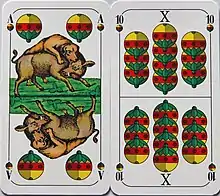Ace-Ten games
An Ace-Ten game is a type of card game, highly popular in Europe, in which the Aces and Tens are of particularly high value.[1]

Description
Many of Europe's most popular card games feature the Ace-Ten scoring system, where the cards count as Ace = 11, Ten = 10, King = 4, Queen or Ober = 3, Jack or Unter = 2. Pip cards below the Ten generally have no card point value and the pack is often shortened by removing the lower pip cards or 'non-counters'. This means that, in a typical shortened pack of between 20 and 36 cards, there are 120 card points and thus a winning total is typically 61 points. Wins are doubled for scoring three-quarters of the total points and trebled for winning every trick, a scoring system known as the Skat schedule after its "most illustrious" example, the German national game of Skat.[1]
There are 3 branches of the Ace-Ten family:[2]
- Schafkopf group. Here the trump suit is bolstered by the promotion of all Unters (Jacks) or all Obers (Queens) or both to be permanent top trumps.
- Marriage group. Bonuses are added for melding a 'marriage' or 'pair' comprising a King and Queen or King and Ober of the same suit and, in many cases, for winning the last trick.[lower-alpha 1]
- Jass group. Has the features above; in addition the trump Jack and trump Nine are permanent top trumps, known as Jass and Nel.
The historical English game of Losing Lodam also uses an Ace-Ten scoring system, but the courts are worth one point less i.e. the King is 3 points, the Queen 2 and the Knave 1.
History
Although the origin of Ace-Ten games is uncertain, it is most likely to have been invented by users of French cards in the Netherlands area, a hypothesis supported by the Dutch origin of the Swiss national game of Jass.[3]
The earliest record of the Ace-Ten scheme dates to 1718 and the French game of Brusquembille.[1]
Games with national or regional status
Many Ace-Ten games have achieved national or regional status. They are usually played with cards typical of their particular country or region. These include:
- Belote, France's national card game, very similar to the Dutch Klaberjass[4]
- Binokel, Württemberg's national card game[5]
- Briscola, one of Italy's most popular games[6]
- Jass, Switzerland's national game[7]
- Klaberjass, the Dutch invented "international, classic two-hander"[8]
- Mariáš, Czechoslovakia's national game[9]
- Pinochle, USA, an "American classic"[2]
- Schafkopf, Bavaria's national game[10]
- Schnapsen, Austria's national game[11]
- Skat, Germany's national game[12]
- Sueca, Portugal's most famous card game[13]
- Tute, Spain's national game[14]
Other Ace-Ten games
Other well known Ace-Tenners include:
- Bezique, "one of the most illustrious games of European high society"[15]
- Brusquembille, with the earliest recorded rules of an Ace-Ten system (1718).[6]
- Doppelkopf, Northern Germany
- Einwerfen, an early ancestor of Ace-Ten games[16]
- Elfern
- Mariage, oldest known game of the Marriage family of Ace-Ten games[17]
- Six-Bid, modern American game derived from Tarock[16]
- Sixty-Six, Bavaria, Germany
- Tarock, Germany
See also
Footnotes
- In Schnapsen and Bavarian Sixty-Six, the last trick wins the game rather than a bonus
References
- Parlett 2008, p. 211.
- Parlett 1991, p. 263.
- Dummett, pp. 561-2.
- Parlett 1991, p. 297.
- Binokel - Die Spielregeln I at www.schwaebisch-schwaetza.de. Retrieved 16 Sep 2018
- Parlett 1991, p. 281.
- Jass at www.learn-swiss-german.ch. Retrieved 16 Sep 2018
- Parlett 1991, p. 295.
- Parlett 1991, p. 285.
- Schafkopf at www.pagat.com. Retrieved 16 Sep 2018
- Tompa 2015, p. 1.
- Parlett 1991, p. 271.
- Sueca, the most famous Portuguese card game at everybodylovesportugal.com. Retrieved 16 Sep 2018
- Parlett, p. 285.
- Parlett 1991, p. 287.
- Parlett 1991, p. 266.
- Parlett 1991, p. 282.
